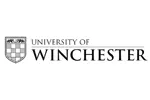

| The award | How you will study | Study duration | Course start | Domestic course fees | International course fees |
|---|---|---|---|---|---|
| MA | Full-time | 1 - 2 year | September | find out | find out |
| MA | Part-time | 2 - 3 years | September | find out | find out |
Digital Media Practice at Winchester is designed to enable students to build on the knowledge and practice developed through related undergraduate study or through previous experience within the media industry.
If English is not your first language:
IELTS 6.5 (including 6.5 in academic writing) or a TOEFL score of 575 (paper-based) or 232 (computer-based) or equivalent
Application process:
UKPASS (full-time applicants only) or Direct Entry Application Form (part-time applicants only)
Programme Content
Over the past few years, career opportunities in the digital media sector have increased dramatically. The interactive media industry is reaching maturity and needs qualified professionals able to offer a diverse range of expertise and originality. This innovative Masters programme allows for either the development and pursuit of a student’s existing digital practice to an advanced level, or the conversion of a student’s knowledge and practice in a complementary discipline to the field of digital media. It is a professionally focused programme that allows for the dynamic understanding and development of theory within the context of practice.
The innovative open nature of the programme structure is designed to accommodate a wide range of specialist interests within the broad spectrum of careers that are available within the digital media industry. These range from leadership roles such as account handler or project manager through to creative roles such as concept designer or content developer. The programme is specifically designed to integrate with professional practitioners and bodies to provide a close and dynamic engagement with the digital media industry. These partnerships give students the starting point to develop their own broad network of professional contacts and to identify key practitioners.
Modules
Study consists of four compulsory modules, two modules allowing a level of specialisation within Digital Media Practice or one from within Digital Media Practice and one drawn from a complementary discipline within the School of Media and Film, and a final dissertation or equivalent extended project.
Compulsory modules:
Digital Media Principles This module functions as an introduction to both the principal concerns of subject area and to the modes of enquiry, methodologies and practical opportunities that are available to the student throughout the rest of the programme. Design Practice This module builds on the introductory module by allowing the students to explore, through undertaking practical projects, a particular area of Design Practice, identified within the introductory module, that is relevant to their area of interest or expertise.
Creative Enquiry Through this module students explore both iterative and evaluative research techniques related to design and models of evaluative and action research appropriate to creative practices. Student-directed Media Project This module allows all students attending programmes within the cognate subjects run by the School of Media and Film to engage in the wider issues and debates concerning media and communication in the twenty-first century. Students study in mixed student teams.
Optional modules focus on the following themes:
Digital Media Management 3D Animation Practice Interaction Design Students engage with the optional modules through the undertaking of individual projects and case studies relevant to their particular area of interest. In this way modules are flexible and reflect the students’ own learning needs.
Assessment
Assessment is by coursework only, using a variety of methods, including production of digital media artefacts, presentations and written reports. Wherever possible, the assessment seeks to utilise professional formats such as business plans, project planning summaries and other relevant ways for students to show the development and understanding of their practice to Masters level against a background knowledge of current practice and practitioners.
Dissertation
Students are required to complete a substantial piece of work in the form of either an appropriate digital media project or as a written dissertation. The project outcome or dissertation is submitted at the end of the programme. Structured models of research and development principles are explored via the Creative Enquiry module.
Careers
The programme is designed to prepare students to enter the field of professional digital media practice as an advanced practitioner. The term ‘advanced’ here indicates an ability to operate successfully within a diverse range of complex, dynamic and personally challenging professional environments as an autonomous, disciplined and creative individual able to identify, initiate and achieve successful project outcomes.
The programme, therefore, is designed for those who are intent on pursuing a professional career in the digital media industry as lead designers or those seeking to develop as account directors, content writers, creative producers or project managers.
Contact University of Winchester to find course entry requirements.
Below are some suggested courses at other providers that you may also be interested in:
Digital International Relations & Diplomacy (UNITAR) Master Degree
EU Business School, Geneva
Find out moreIf you do not meet the entry requirements for this course then consider one of these postgraduate preparation courses from another institution:
Graduate Diploma of Engineering (Civil: Structural)
Engineering Institute of Technology
Find out moreThere are 143 other courses listed from University of Winchester. A selection of these are displayed below:
Find out more about studying in the United Kingdom